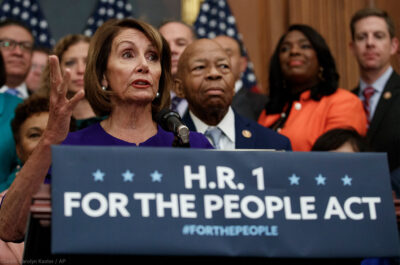Campaign Finance Reform
The ACLU works in courts, legislatures, and communities to defend and preserve the individual rights and liberties that the Constitution and the laws of the United States guarantee everyone in this country.

Stay informed about our latest work in Campaign Finance Reform.
By completing this form, I agree to receive occasional emails per the terms of the ACLU's privacy statement.
The Latest

Congress, Let’s Fix the Problems in H.R. 1 So We Can Enact the Bill’s Much-Needed Reforms


NYCLU Files Lawsuit Challenging Overbroad Campaign Finance Law that Threatens Free Speech


Overbroad Campaign Finance Bill Threatens Free Speech


NYCLU Applauds Campaign Finance Reform Opinion Issued by Governor’s Office
Explore More
What's at Stake
The ACLU believes that the system of electing candidates to federal office is badly in need of repair. We will continue to advocate for reform of the current system, including in support of our longstanding commitment to public financing of campaigns. In doing so, we will stress fidelity to the principles protected by the First Amendment with the goal of expanding, not limiting, political speech.
In a 2010 case called Citizens United v. Federal Election Commission, the U.S. Supreme Court ruled that independent political expenditures by unions and corporations (including non-profit corporations such as Planned Parenthood, the National Rifle Association, and the ACLU) are protected under the First Amendment and are not subject to restriction by the government. That decision has sparked a great deal of controversy. Unfortunately, legitimate concern over the influence of “big money” in politics has led some to propose a constitutional amendment that would reverse the decision—by limiting the free speech clause of the First Amendment.
The ACLU firmly opposes this approach. In our view, the answer to concerns over the escalating cost of political campaigns is to expand, not limit, the resources available for political advocacy. Thus, the ACLU supports a comprehensive and meaningful system of public financing that would help create a level playing field for every qualified candidate. We support carefully drawn disclosure rules. We support reasonable limits on campaign contributions, and we support stricter enforcement of existing bans on coordination between candidates and super PACs.
Our system of free expression is built on the premise that the people get to decide what speech they want to hear; it is not the role of the government to make that decision for them.
The ACLU believes that the system of electing candidates to federal office is badly in need of repair. We will continue to advocate for reform of the current system, including in support of our longstanding commitment to public financing of campaigns. In doing so, we will stress fidelity to the principles protected by the First Amendment with the goal of expanding, not limiting, political speech.
In a 2010 case called Citizens United v. Federal Election Commission, the U.S. Supreme Court ruled that independent political expenditures by unions and corporations (including non-profit corporations such as Planned Parenthood, the National Rifle Association, and the ACLU) are protected under the First Amendment and are not subject to restriction by the government. That decision has sparked a great deal of controversy. Unfortunately, legitimate concern over the influence of “big money” in politics has led some to propose a constitutional amendment that would reverse the decision—by limiting the free speech clause of the First Amendment.
The ACLU firmly opposes this approach. In our view, the answer to concerns over the escalating cost of political campaigns is to expand, not limit, the resources available for political advocacy. Thus, the ACLU supports a comprehensive and meaningful system of public financing that would help create a level playing field for every qualified candidate. We support carefully drawn disclosure rules. We support reasonable limits on campaign contributions, and we support stricter enforcement of existing bans on coordination between candidates and super PACs.
Our system of free expression is built on the premise that the people get to decide what speech they want to hear; it is not the role of the government to make that decision for them.